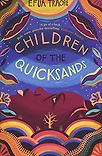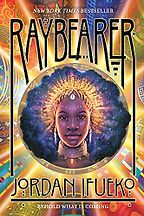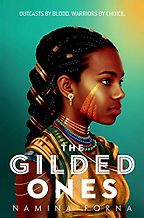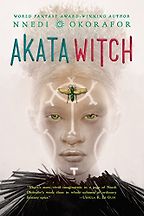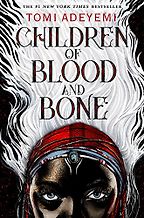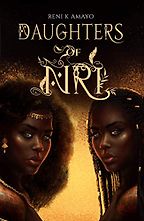With one exception, all the West African fantasy books for teens that you have picked are debut novels by young authors. Is there something in the stories of West Africa which turns you into writers?
I think older generations of writers benefitted from stories told to them by their parents or grandparents and grew up closer to their roots and to the various African traditions of the tribes they grew up in. The younger generations grew up reading ‘white’ children’s books at a time when oral storytelling and many other traditions had been gradually erased from African lives. Social media and western lifestyle have replaced these traditions. The younger generations had something vital missing in their lives when growing up: stories that reflected them. If you never saw yourself represented in the books you read or in children’s films or TV shows, I believe that the urge to write for young readers could be stronger. This applies even more so for Black authors of African origin because books for kids in which African children or an African (inspired) setting is depicted are almost non-existent. Even though my childhood is long behind me and I might say that I write for my children or other kids, I have to admit that every children’s book I write feels like I’m writing it for the little girl I was then.
I should say for the benefit of our readers that your book, Children of the Quicksands, is a lovely story for younger children (9 to 12 year olds) about city girl Simi who goes to stay with her grandmother in a village in Nigeria, and the magical experiences she has that summer when she is 13.
Why do you think we didn’t get these books earlier? Did the Marvel Black Panther have to be successful to make publishers ready for West African inspired fantasy for teens and young adults?
Unfortunately, publishers have definitely needed some triggers to make them ready and I am sure Black Panther helped a lot. But I don’t think Black Panther alone did the job. Nnedi Okorafor, for example, has been at it for quite some time now, resiliently writing brilliant African inspired books, and Tomi Adeyemi’s Children of Blood and Bone came out about the same time as Black Panther and was also a big success. African fantasy is at its beginnings, yes, but every successful author or film in this genre right now is doing pioneer work and moving the genre forward step by step, unfolding its huge potential.
All your book picks were first published in the US or the UK, and the authors – including yourself – have a dual or multicultural background. Do you feel that you act as a literary bridge?
For me, writing has definitely been like a bridge connecting me back to my childhood. Being away from your home or living between two worlds does something to you. You feel disconnected, far away, and you nourish your yearning with scraps of memories, drops of news or stories from home or short-lived moments spent there on holidays. I think nostalgia has a way of activating you and making you turn those craving emotions into stories. Maybe in that sense writing is sometimes a cry of homesickness, a call to say even though I am far away I haven’t forgotten my roots and I am singing my home-song out here and holding up the flag.
In fantasy there is often a binary good-versus-evil scenario, but in several of the West African inspired books for teenagers that you have picked, the focus is more on a quest for balance – justice versus order, men and women ruling equally, harmony… Is there something about West Africa that makes unity across divides especially compelling?
Well, I am not very surprised at that. Take Nigeria, for example. Nigeria is an incredibly diverse mix of different peoples, languages, beliefs, cultural attires and traditions. There are more than 200 different languages and ethnic groups. Christians, Muslims, traditional religions, monogamy and polygamy, patriarchal and modern societies all live side by side. Most people grow up bilingual or even multi-lingual, often with roots in different cultures and beliefs. This is to say, there is not one way of being, of seeing or doing things in Nigeria. Everyday life is a natural striving for balance and compromise. It is a great feat to fit so many different cultures under the unnaturally-formed umbrella of one country. The same applies for many other West African and African countries. And for diasporic Africans, the quest for balance, the search for harmony, acceptance and identity, is even more complex. A story told with this background will not surprisingly be multi-layered.
A great reservoir for nuanced storytelling. Shall we move on to your first pick? Raybearer by Jordan Ifueko.
Raybearer fascinated me right from the beginning through its lyrical prose. Jordan Ifueko has a beautiful way with words and it was an absolute pleasure to read this book. Raybearer is about 16 year old Tarisai, hidden away from the world by her mysterious mother, The Lady. All her life Tarisai is trained and tested by tutors, preparing her for her life mission, which is to join the crown prince council of 12 members representing the 12 realms. When she discovers that her purpose is to kill the one person in the world she has sworn to love and protect, Tarisai embarks on a journey to find out the truth about herself.
I was absolutely intrigued by the complex structure of Ifueko’s world-building and the enchanting mythical creation story of her world. Her characters and their relationships are deep and complex and very relatable. She included themes of belonging, and built in snippets of some wonderful West African customs like the griots, who are traditional storytellers. And she also included a theme close to my heart, which is the erasure of old traditions and cultures through new powerful ones.
Those scenes will resonate across the world, I am sure, especially the book burning. I also think the creation story is wonderfully told, using sounds and rhythm that evoke oral storytelling. In fact, the Storyteller has a special place in this creation myth, as the oldest being, before earth and water. I agree that this book is very beautifully written and its appeal will not be limited to young adults.
The ending of the book was breathtaking and I can hardly wait to finally read the sequel.
Let’s talk about your next book recommendation, The Gilded Ones by Namina Forna.
This is a dark, powerful story of female empowerment that I had been very eager to read and I was not disappointed.
16 year old Deka’s world falls apart when on the day of the blood ceremony her blood runs gold, the colour of impurity, rather than red. Already an outsider all her life because of her mother’s origin, Deka has always only wanted to belong. But a mysterious woman comes to her with a choice: stay in the village and submit to the brutal fate of an outcast, or leave to fight for the emperor in an army of girls just like her. Deka chooses the army of alaki – near-immortals with rare powers. And together with new friends and allies Deka joins the fight to stop the empire’s greatest threat.
Namina Forna sends Deka on an epic journey of sisterhood, self-discovery and struggle against a deeply patriarchal and oppressive society. The world is skilfully crafted, the enemy is ghastly and spine-chilling and Namina masterfully builds up a mystery around these evil creatures, which unfolds towards the end, keeping you glued to the pages.
My copy is printed with a violence warning on the first page.
The story is at times traumatic and violent which was sometimes quite shocking. But it is a moving read that leaves a powerful, lasting impression.
The description of trauma among the young women in The Gilded Ones is very strong, as is the gold blood metaphor for the objectification of women. And Forna makes readers think about the influences over how we perceive ourselves, which is such an important topic, especially for teenage readers.
Your next pick, Akata Witch (published in Nigeria as What Sunny Saw in the Flames), is by Nnedi Okorafor who has written books for all ages, and several of the Wakanda Marvel comics. It is the first book in the Nsibidi Scripts trilogy, and the second book, Akata Warrior, won the 2018 Lodestar Award for Best Young Adult Book. It is a bit different from the other fantasy books you’ve picked in that it is partly set in the real world. What struck you most about it?
What I loved most about this book were the mythological aspects. In Nigeria and in much of Africa, the supernatural is still very much a part of everyday life and I find the idea of a magical world, parallel to ours, absolutely befitting in an African setting. The story is about 12 year old Sunny, a Nigerian-American albino girl who moves to Nigeria from America and has problems fitting in. When a boy in her class rescues her from a bully and becomes her friend, she soon discovers she has magical abilities and is initiated into the Leopard society, a magical parallel world. Sunny and her new friends soon find themselves on a dangerous mission to stop a terrible and evil villain.
Nnedi Okorafor has an exceptionally creative mind (which anyone who has read any of her other books will already know) and in Akata Witch she created a stunning world skilfully interwoven with Igbo mythology. Some of the wonderful curiosities of the mythology are the fiery palm-frond-covered masquerade Ekwensu, and the Tungwas, which are floating balls of flesh that can spontaneously explode into tufts of hair and teeth. I love that she included the Nsibidi scripts, a fascinating old writing system in southern Nigeria that is said to date back earlier than 400 AD.
It is worth mentioning that this book is probably suitable for slightly younger readers than the other novels that you have picked. But whereas books with a 12 year old protagonist are often aimed at younger children, in this case the villain is a serial killer who draws power from child victims to increase his magic, and Sunny and her friends have to rely on themselves, so it is generally recommended for readers age 12+.
Your next pick is Children of Blood and Bone (the first in the Legacy of Orïsha series) by Tomi Adeyemi, which has won a number of prizes including Audiobook of the Year in 2019. Can you tell us about it?
When this book came out I was literally trembling with excitement because I had just written Children of the Quicksands, which is also built on Yoruba mythology and also draws on the powers of the Orishas – goddesses and gods who command the elements. I remember shouting: I knew it! I knew we had wonderful mythologies that people would love to read about!
Tomi Adeyemi’s action-filled and incredibly fast-paced novel is about 17 year old Zélie and her companions who have all suffered in different ways at the hands of the cruel king and their unjust world. In a tight race against time, they are on a quest to bring magic back to the land of Orïsha and restore power to the oppressed maji.
Five Books interviews are expensive to produce. If you're enjoying this interview, please support us by donating a small amount.
The story is written from the points of view of three very different characters giving you a wonderful insight from opposite perspectives.
In addition to showing the motivations of the different protagonists, the structure gives readers advance warning of danger coming from the antagonist’s side, so it adds to the suspense.
Yes, the scenes are remarkably evocative and the storyline, which explores themes of racial and social injustice, is very powerful. Her chapters generally leave you feeling like you were run over by a whirlwind.
I like how Adeyemi shows that a system of oppression is not limited to physical violence (although that’s certainly a central feature), but also how language is an important tool in dehumanising others, and the use of disproportionate taxation for certain groups.
Yes, she does that in a very impressive way, making the reader hurt and root for the protagonists.
And it is very cinematic, with the fight scenes and the descriptions of places such as Zélie’s fishing village on stilts and the arena in the desert.
Yes, absolutely! The book has a very cinematic and epic feel to it and I was thrilled to hear that there are plans to turn it into a movie.
Let’s move on to your final West African fantasy book pick for teenagers, Daughters of Nri (the first in the Return of the Earth Mother series) by Reni K Amayo.
I have a strong fascination with twins and the cover of this book is incredible, depicting the beautiful twin protagonists. I just had to read it! This is the story of Naala and Sinai, twin girls separated at birth and growing up under very different circumstances. They are yet to find each other and discover the dormant magical power that lies within them. And together they will have to face the Eze, the terrible ruler of the Kingdom of Nri, who separated them, who defeated the gods himself and will go to any length to keep the power in his hands. Reni K Amayo draws you into her intricately crafted world with vivid scenery and a lot of imagination.
Yes there are some very beautiful details, such as the geometric floating oku flames and vibrant descriptions of the forests.
Absolutely! And she creates fascinating, multi-layered characters and relationships, thereby touching on feminist themes like solidarity between female enemies in the face of a greater enemy: a patriarchal society. The story takes a gentle hold of you but then tightens its grip firmly until you can’t drop the book. I was particularly intrigued by the creation myth and the departure of the gods and goddesses from earth. Not everything was revealed in this book and I look forward to the sequel which I believe will reveal more of this beautiful creation myth.
I was also struck by the creation story in which some gods rule the natural forces such as rain and thunder, others have emotional elements, and some have power over conceptual elements such as justice.
You mentioned the Nsibidi scripts earlier. After reading these novels I have looked up Leopard societies, the historical kingdom of Nri, the incidence of FGM in Sierra Leone, and so on. For a reader with no background knowledge of the region, it is impossible to know how much of these West African inspired fantasy books for teenagers is based in common knowledge and mythology and what is made up. I am curious to know to what extent you feel that we will have had different reading experiences as a result?
That’s very possible! I am sure that, to some extent, we will have had different reading experiences. Equally enthusiastic and impressed experiences, I can imagine, but perhaps with some more moments of recognition on my side and admiration for the finesse with which mythologies, history or traditions have been intertwined with creative storytelling.
Sign up here for our newsletter featuring the best children’s
and young adult books, as recommended by authors, teachers, librarians and,
of course, kids.
I think teenage readers of any gender will enjoy these West African fantasy novels, all of which have strong female characters. Are there any others you would like to highlight, perhaps with more male protagonists?
I just began reading A Song of Wraiths and Ruin by Roseanne A. Brown which has started off just as beautifully as the previously mentioned books and is alternately narrated from the perspectives of a female and male protagonist. I recently read Ayesha Harruna Attah’s The Deep Blue Between which is a beautiful story of family, fate and loss set in 19th century West Africa and Brazil. It is not fantasy but I’ll mention it here because I really loved the incredibly vivid depiction of life and its challenges in that period of history. It will appeal to young readers and anyone who loves historical fiction. As mentioned before, the number of African inspired fantasy books for teens and young adults has greatly increased in the past few years. I have only highlighted and discussed five here but there are so many more. However, what I still miss are more African-inspired books for younger readers. This was why I felt the urge to write Children of the Quicksands for my daughters.
There are still so many stories that need to be told, so many beautiful African mythologies, traditions, folklore and settings to draw on and I hope more authors will be inspired to write for younger readers as well.
Interview by Tuva Kahrs
August 31, 2021. Updated: December 21, 2025
Five Books aims to keep its book recommendations and interviews up to date. If you are the interviewee and would like to update your choice of books (or even just what you say about them) please email us at [email protected]

